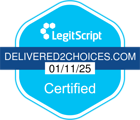Table of Contents
ToggleIntroduction
If you have violated the Department of Transportation’s (DOT) drug and alcohol testing program, you will be required to complete a Substance Abuse Professional (SAP) evaluation. For many employees, the process may seem confusing or overwhelming. This guide explains the complete SAP evaluation process step-by-step, so you know exactly what to expect and how to return to duty safely and in compliance with DOT regulations.
What is an SAP Evaluation?
A SAP evaluation is a federally mandated assessment conducted by a DOT-qualified Substance Abuse Professional. It is required for employees in safety-sensitive positions (such as truck drivers, pilots, railroad workers, and others) who fail or refuse a DOT drug/alcohol test.
The SAP’s role is not to punish but to evaluate the situation, recommend the right treatment or education, and guide the employee back to work safely. At Delivered to Choices, our qualified SAP professional provide confidential, supportive evaluations to help employees complete this process successfully.
Why is it Required?
The DOT requires SAP evaluations to ensure public safety. Anyone working in a safety-sensitive role must be drug- and alcohol-free. The SAP evaluation ensures that:
- The employee addresses any substance use issues.
- Corrective steps are taken before resuming safety-sensitive duties.
- Employers remain compliant with federal regulations (49 CFR Part 40).
Step-by-Step SAP Evaluation Process
1. Initial Assessment
The process begins with a confidential, one-on-one meeting with a SAP.
- The SAP reviews your violation details.
- They ask about your substance use history, personal factors, and background.
- Based on this interview, they determine the severity of the issue and what steps are necessary.
2. Treatment or Education Plan
After the assessment, the SAP recommends a personalized plan. This can include:
- Education classes (drug/alcohol awareness)
- Counseling or therapy sessions
- Inpatient or outpatient treatment (for severe cases)
3. Completing the Program
You must successfully complete the recommended program. The SAP monitors progress through direct check-ins or reports from treatment providers.
4. Follow-Up Evaluation
Once you finish the program, you meet with the SAP again. This second evaluation ensures:
- You completed all requirements.
- You learned something to avoid future violations.
- You are ready to return to safety-sensitive duties.
5. Return-to-Duty Testing
If cleared, your employer will schedule a supervised return-to-duty test. You must test negative before resuming work.
Owner operators, your Consortium/Third-party Administrator (C/TPA) will schedule the RTD test.
6. Aftercare & Follow-Up Testing
Even after returning to duty, the SAP created a follow-up testing plan:
- Minimum of 6 unannounced follow-up tests in the first year.
- Testing can continue for up to 5 years.
This ensures long-term accountability and safety. - According to DOT Rule, the employee cannot know exactly when the follow-up testing plan ends or exactly how many follow-up tests are on that plan.
What to Expect During the Evaluation
- Confidentiality: Your conversations with the SAP remain private. Employers are only informed of your completion status.
- Honest Discussion: Be open and truthful; accurate information helps the SAP guide you effectively.
- Supportive Process: The SAP’s role is to help you get back to work safely, not to judge.
How Long Does the Process Take?
- Minor cases: A short educational program may take a few days to several weeks.
- Severe cases: Rehab and long-term follow-up testing can last months or years.
The timeline depends entirely on the assessment and your commitment to completing the program.
Key Takeaways
- The SAP evaluation is mandatory after a DOT drug/alcohol violation.
- It follows a clear step-by-step process: assessment → treatment/education → follow-up → testing → aftercare.
- Successful completion is required to legally return to safety-sensitive duties.
- The process is designed to support recovery and protect public safety.
FAQs
Q1: Is the SAP evaluation confidential?
Yes. Details remain private between you and the SAP. Employers only receive completion status.
Q2: Can I choose my own SAP?
Yes, but the SAP must be DOT-qualified.
Q3: How many follow-up tests will I have to take?
At least 6 tests in the first year, with the possibility of extended testing up to 5 years. You can’t know the exact number of years or number of tests.
Q4: What happens if I don’t complete the SAP process?
You cannot return to any safety-sensitive function until all steps are finished.
Call-to-Action
If you’ve tested positive or violated DOT drug and alcohol rules, don’t wait—start your SAP evaluation today. At Delivered to Choices, our DOT-qualified SAP professionals will guide you through the entire process, from assessment to return-to-duty, with care and confidentiality.
📞 Contact us today to schedule your evaluation and take the first step toward getting back to work.





